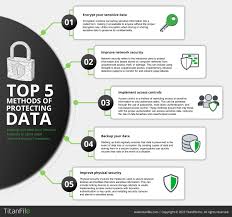
Protecting Your Data: A Comprehensive Guide
In today’s digital age, data is more valuable than ever. From personal information to business-critical data, safeguarding your information against cyber threats and data loss is paramount. Here are some essential tips to help you protect your data:
Use Strong Passwords
Ensure that your passwords are complex and unique for each account. Use a combination of letters, numbers, and special characters to create secure passwords that are difficult to crack.
Enable Two-Factor Authentication
Add an extra layer of security by enabling two-factor authentication on your accounts. This additional step helps prevent unauthorized access even if your password is compromised.
Regularly Backup Your Data
Backup your important files and documents regularly to an external hard drive or a cloud storage service. In the event of data loss or a ransomware attack, having backups ensures that you can recover your information quickly.
Keep Your Software Updated
Regularly update your operating system, antivirus software, and applications to patch security vulnerabilities and protect against the latest threats.
Be Cautious of Phishing Emails
Avoid clicking on links or downloading attachments from suspicious emails. Phishing emails often trick users into revealing sensitive information or installing malware on their devices.
Encrypt Your Data
Encrypt sensitive data stored on your devices or transmitted over networks to prevent unauthorized access. Encryption adds an extra layer of protection to ensure that only authorized users can view the information.
Educate Yourself and Others
Stay informed about common cybersecurity threats and best practices for protecting your data. Educate yourself and others in your organization about cybersecurity awareness to minimize risks.
By following these tips and implementing robust security measures, you can significantly reduce the risk of data breaches and ensure that your information remains safe and secure in today’s digital world.
6 Essential Tips to Safeguard Your Data from Cyber Threats
- Use strong and unique passwords for each account.
- Enable two-factor authentication whenever possible.
- Regularly update your software and devices to patch security vulnerabilities.
- Be cautious about sharing personal information online or with unknown sources.
- Backup your data regularly to prevent loss in case of cyber attacks or hardware failure.
- Use reputable antivirus software to protect against malware and viruses.
Use strong and unique passwords for each account.
To enhance the security of your accounts and protect your valuable data, it is crucial to use strong and unique passwords for each account you create. By incorporating a mix of letters, numbers, and special characters into your passwords, you can create robust defenses against cyber threats. Using different passwords for each account also prevents a single security breach from compromising all your accounts. This simple yet effective practice significantly reduces the risk of unauthorized access and safeguards your sensitive information from potential cyber attacks.
Enable two-factor authentication whenever possible.
Enabling two-factor authentication whenever possible is a crucial step in enhancing the security of your accounts and protecting your data. By requiring a second form of verification beyond just a password, such as a code sent to your phone or email, two-factor authentication adds an extra layer of defense against unauthorized access. This additional security measure significantly reduces the risk of cyber attacks and ensures that even if your password is compromised, malicious actors will have a much harder time gaining entry to your accounts. Take advantage of two-factor authentication to bolster the protection of your sensitive information and safeguard your online presence.
Regularly update your software and devices to patch security vulnerabilities.
Regularly updating your software and devices is a crucial step in protecting your data from cyber threats. By installing the latest security patches and updates, you can address known vulnerabilities that hackers may exploit to gain unauthorized access to your information. Keeping your software up-to-date ensures that you have the most secure defenses against evolving cyber threats, helping to safeguard your data and maintain the integrity of your digital assets.
Be cautious about sharing personal information online or with unknown sources.
It is crucial to exercise caution when sharing personal information online or with unknown sources. Cybercriminals often exploit unsuspecting individuals by phishing for sensitive data through fraudulent emails, websites, or social engineering tactics. By being mindful of the information you disclose and verifying the legitimacy of requests for personal data, you can protect yourself from identity theft, financial fraud, and other malicious activities that aim to compromise your privacy and security. Stay vigilant and only share personal information with trusted sources to safeguard your data in today’s digital landscape.
Backup your data regularly to prevent loss in case of cyber attacks or hardware failure.
Backing up your data regularly is a crucial step in protecting your information from potential cyber attacks or hardware failures. By creating backups of your important files and documents, you can ensure that even if your system is compromised, you have a secure copy of your data that can be easily restored. Regular backups provide peace of mind and serve as a safety net against unexpected data loss, allowing you to recover swiftly and resume normal operations without disruption.
Use reputable antivirus software to protect against malware and viruses.
Using reputable antivirus software is a crucial step in safeguarding your data against malware and viruses. By installing trusted antivirus programs, you can proactively detect and remove malicious software that may compromise the security of your devices and data. Regularly updating your antivirus software ensures that you are equipped to defend against the latest threats, providing a strong defense mechanism to keep your information safe from cyber attacks.
